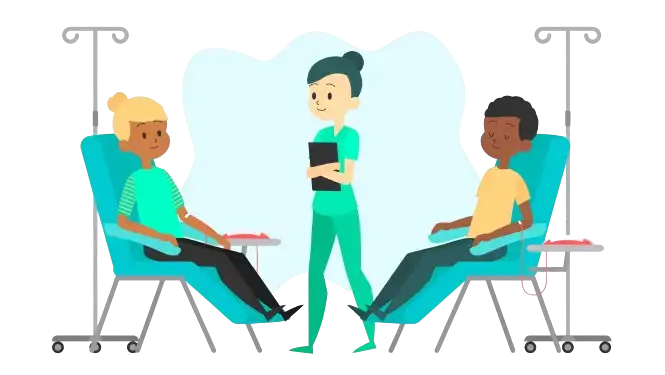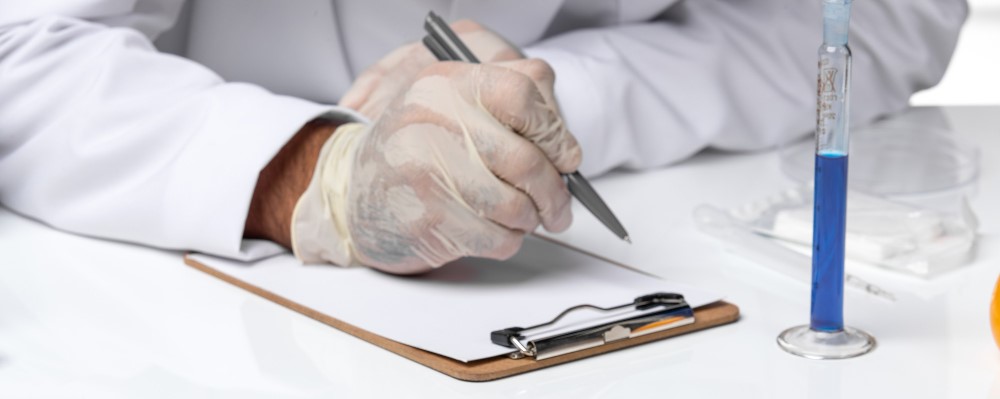Tests for kidney Donors and Recipients
Topics Covered
- Tests for Kidney Donors
- Tests for kidney Recipients
- Myths About Kidney Donor and Recipient Screening
- Conclusion
Potential kidney donors and recipients must undergo medical evaluations before donating a kidney. These evaluations ensure the safety and success of the kidney donation and transplant. Here, we explain the primary evaluations that recipients and donors must undergo.

Tests for Kidney Donors
Blood Type Test
Checking blood types is the first step in establishing compatibility between the donor and receiver. By doing this, adverse reactions are avoided both during and after the transplant.
Renal Function Test (RFT)
It is important to assess the donor’s renal function even when the donation is not a kidney. These tests, which measure blood levels of urea and creatinine, help determine whether the kidneys can eliminate waste from the body.
Liver Function Test (LFT)
Tests are also necessary for the donor to ensure the condition of their liver. These tests measure specific liver enzyme and protein levels in the blood, providing information to clinicians about the liver’s health.
24-Hour Urine Protein Test
It is important to assess the amount of protein in the urine throughout a 24-hour period for kidney donors. Kidney issues may be diagnosed by an excess of protein.
Chest X-ray and ECG
After testing, medical experts will facilitate the ECG and chest X-ray to confirm the donor’s heart and lung health. These tests are vital in identifying any hidden diseases that can affect the success of the transplant or disqualify the donor. Therefore, after the two tests, the donor is sure that he is in good health and that no complications are expected after surgery.
CT Scans and MRIs
The decision to become a kidney donor is serious and requires thorough reflection. Accordingly, the medical team evaluates the “psychological aspects of the donation process and the donor’s understanding of the response”: they conduct a psychological assessment. Thus, the assessment demonstrates the psychological impacts of the donation, confirming the donor’s readiness to proceed with the surgery.
Psychological Evaluation
Being a kidney donor is a big decision that needs careful consideration. Therefore, the medical team conducts a psychological assessment to ensure that they fully inform the donor about the donation procedure and get their consent. The evaluation considers the psychological effects of donation to confirm that the donor is prepared to continue with the surgery.
Infectious Disease Screening
In addition, healthcare professionals carry out a thorough screening for infectious diseases, including testing for the West Nile virus, HTLV, and syphilis. This step is essential to protect both parties’ health and increase the chance of a successful transplant by preventing the transfer of illnesses from the donor to the recipient.
Tests for kidney Recipients
Compatibility Testing
Recipients must undergo testing to confirm that their blood type matches that of the donor, just like donors do. This makes the body less likely to reject the new kidney. Matching blood types and antigens (tissue typing) increases the long-term success of the transplant and decreases the risk of problems.
Immune System Checks
Medical professionals perform tests on recipients to observe how the new kidney might affect their immune system. These examinations aid in determining whether the body will accept or reject the given kidney. A successful transplant depends on the donor and recipient matching as many markers as feasible. This is achieved through tests like HLA typing.
Infectious Disease Tests
HIV and hepatitis are two illnesses that can be transferred through transplantation. Both donors and recipients are checked for them to ensure that the kidney does not spread any diseases. To prevent difficulties after transplantation, it is essential to confirm that neither party has any infectious infections.
Heart and Lung Checks
Recipients must have their hearts and lungs examined to ensure that they are healthy enough for the transplant procedure. These examinations consist of respiratory tests and cardiac scans. To fully analyze the heart’s function and find any potential problems that could complicate the surgery, examinations may also involve angiograms and stress tests.
Myths About Kidney Donor and Recipient Screening
Regarding the kidney donor and recipient screening procedure, there are a number of myths and misunderstandings. In order to guarantee that correct information is available, it is crucial to address these:
Myth 1: Donors Can Donate Without So Many Testing:
Reality: To guarantee the health of the donor and the suitability of the donated kidney, extensive testing is necessary. Ignoring these exams could put in danger both the recipient and the donor.
Myth 2: Blood type is the only factor in compatibility:
Reality: To prevent rejection, compatibility is determined by a number of variables, including tissue types, crossmatching, and blood type.
Myth 3: Donors Can Resume Their Regular Lives Right Away After Giving Blood:
Reality: After surgery, donors require a period of recuperation. Although most resume their regular activities, a smooth recovery depends on their adherence to medical recommendations.
Myth 4: If the donor is a family member, recipients don’t need to be tested.
Reality: Comprehensive testing is necessary to guarantee compatibility and lower the possibility of rejection and other issues, even in cases when the donor is a family member.
Conclusion
Thorough health assessments of both the donor and the recipient are essential to guarantee the safety and efficacy of the transplant process. These extensive examinations are more than just standard operating procedures; they play a crucial role in evaluating the compatibility of the donor and recipient and whether or not their bodies are suitably prepared for the difficulties associated with transplantation. Doctors can greatly improve outcomes by carefully examining everything from kidney function to blood compatibility to possible infectious infections.
In addition, the field of medical technology is always developing, leading to improvements in treatment regimens and diagnostic methods. Transplant success rates rise as a result of these developments, which also make transplant procedures safer and more effective. As a result, more lives are saved and the recipients’ quality of life is significantly raised. The hope for transplant patients increases with every technological advancement, creating a more promising future for those in need of life-saving kidney transplants.
We Support Kidney Swap
At kidney transplant support, we know how hard it is to find the right kidney donor when you really need a transplant. Join our community to quickly find a match and move towards a healthier life with our kidney swap program.







